- Home
- Colson Whitehead
The Underground Railroad Page 6
The Underground Railroad Read online
Page 6
“He know I’m coming?” Cora asked.
He shook his head.
“Then two surprises as good as one,” she said. She lifted her sack. “We got enough food, anyway.”
He had all night to get used to the idea. It would be a long time before they slept. Eventually Lovey stopped crying out at every sudden noise from the night creatures, or when she stepped too deep and the water surged to her waist. Cora was acquainted with this squeamish quality of Lovey’s, but she did not recognize the other side of her friend, whatever had overtaken the girl and made her run. But every slave thinks about it. In the morning and in the afternoon and in the night. Dreaming of it. Every dream a dream of escape even when it didn’t look like it. When it was a dream of new shoes. The opportunity stepped up and Lovey availed herself, heedless of the whip.
The three of them wended west, tromping through the black water. Cora couldn’t have led them. She didn’t know how Caesar did it. But he was ever surprising her. Of course he had a map in his head and could read stars as well as letters.
Lovey’s sighs and curses when she needed a rest saved Cora from asking. When they demanded to look in her tow sack, it contained nothing practical, only odd tokens she had collected, like a small wooden duck and a blue glass bottle. As for his own practicality, Caesar was a capable navigator when it came to finding islands. Whether or not he kept to his route, Cora couldn’t tell. They started tracking northeast and by the time it got light they were out of the swamp. “They know,” Lovey said when the orange sun broke in the west. The trio took another rest and cut a yam into slices. The mosquitoes and blackflies persecuted them. In the daylight they were a mess, splashed up to their necks in mud, covered in burrs and tendrils. It did not bother Cora. This was the farthest she had ever been from home. Even if she were dragged away at this moment and put in chains, she would still have these miles.
Caesar tossed his walking stick to the ground and they took off again. The next time they stopped, he told them that he had to go find the county road. He promised to return soon, but he needed to take measure of their progress. Lovey had the sense not to ask what happened if he didn’t return. To reassure them, he left his sack and waterskin next to a cypress. Or to help them if he did not.
“I knew it,” Lovey said, still wanting to pick at it despite her exhaustion. The girls sat against the trees, grateful for solid, dry dirt.
Cora filled her in on what there was left to tell, going back to Jockey’s birthday.
“I knew it,” Lovey repeated.
“He thinks I’m good luck, because my mother was the only one.”
“You want luck, cut off a rabbit foot,” Lovey said.
“What your mother gonna do?” Cora asked.
Lovey and her mother arrived on Randall when she was five years old. Her previous master didn’t believe in clothing pickaninnies so it was the first time she had something on her back. Her mother, Jeer, had been born in Africa and loved to tell her daughter and her friends stories of her childhood in a small village by a river and all the animals who lived nearby. Picking broke her body. Her joints were swollen and stiff, making her crooked, and it anguished her to walk. When Jeer could no longer work she looked after babies when their mothers were in the fields. Despite her torments, she was always tender to her girl, even if her big toothless smile fell like an ax the moment Lovey turned away.
“Be proud of me,” Lovey answered. She lay down and turned her back.
Caesar appeared sooner than they expected. They were too close to the road, he said, but had made good time. Now their party had to press on, get as far as they could before the riders set out. The horsemen would wipe out their lead in short order.
“When we going to sleep?” Cora asked.
“Let’s get away from the road and then we see,” Caesar said. From his comportment, he was spent, too.
They set their bags down not long after. When Caesar woke Cora, the sun was getting down. She had not stirred once, even with her body draped awkwardly over the roots of an old oak. Lovey was already awake. They reached the clearing when it was almost dark, a cornfield behind a private farm. The owners were home and busied themselves in their chores, chasing each other in and out of the small cottage. The fugitives withdrew and waited until the family put out their lamps. From here until Fletcher’s farm the most direct route was through people’s land, but it was too dangerous. They stayed in the forest, looping around.
Ultimately the pigs did them in. They were following the rut of a hog trail when the white men rushed from the trees. There were four of them. Bait laid on the trail, the hog hunters waited for their quarry, which turned nocturnal in the hot weather. The runaways were a different sort of beast but more remunerative.
There was no mistaking the identity of the trio, given the specificity of the bulletins. Two of the hog hunters tackled the smallest of the party, pinning her to the ground. After being so quiet for so long—the slaves to escape the detection of hunters, and the hunters to escape the detection of their prey—all of them cried out and shrieked with their exertions. Caesar grappled with a heavyset man with a long dark beard. The fugitive was younger and stronger, but the man held his ground and seized Caesar by the waist. Caesar fought like he had struck many a white man, an impossible occurrence or else he would have been in the grave long ago. It was the grave the runaways fought against, for that was their destination if these men prevailed and returned them to their master.
Lovey howled as the two men dragged her into the darkness. Cora’s assailant was boyish and slender, perhaps the son of one of the other hunters. She was taken unawares but the moment he laid hands on her person, her blood quickened. She was brought back to the night behind the smokehouse when Edward and Pot and the rest brutalized her. She battled. Strength poured into her limbs, she bit and slapped and bashed, fighting now as she had not been able to then. She realized she had dropped her hatchet. She wanted it. Edward was in the dirt and this boy would join him, too, before she was taken.
The boy yanked Cora to the ground. She rolled over and bashed her head against a stump. He scrambled to her, pinning her. Her blood was hot—she reached out and came up with a rock that she slammed into the boy’s skull. He reeled and she repeated her assault. His groans ceased.
Time was a figment. Caesar called her name, pulling her up. The bearded man had fled, as much as the darkness allowed her to see. “This way!”
Cora cried after her friend.
There was no sign of her, no way to tell where they had gone. Cora hesitated and he tugged her roughly forward. She followed his instructions.
They stopped running when they realized they had no inkling of where they were headed. Cora saw nothing for the darkness and her tears. Caesar had rescued his waterskin but they had lost the rest of their provisions. They had lost Lovey. He oriented himself with the constellations and the runaways stumbled on, impelled into the night. They didn’t speak for hours. From the trunk of their scheme, choices and decisions sprouted like branches and shoots. If they had turned the girl back at the swamp. If they had taken a deeper route around the farms. If Cora had taken the rear and been the one grabbed by the two men. If they had never left at all.
Caesar scouted a promising spot and they climbed trees, sleeping like raccoons.
When she stirred, the sun was up and Caesar paced between two pines, talking to himself. She descended from her roost, numb in her arms and legs from her entanglement in the rough limbs. Caesar’s face was serious. By now the word had spread about last night’s altercation. The patrollers knew the direction they traveled. “Did you tell her about the railroad?”
“I don’t think so.”
“I don’t think I did. We were foolish not to think on this.”
The creek they waded at noon was a landmark. They were close, Caesar said. After a mile, he left her to scout. On his return they adopted a more shallow track in the woods that permitted them to barely see houses through the brush.
“That’s it,�
�� Caesar said. It was a tidy one-story cottage that looked out on a pasture. The land had been cleared but lay fallow. The red weathervane was Caesar’s sign that this was the house, the yellow curtains pulled shut in the back window the signal that Fletcher was home but his wife was not.
“If Lovey told them,” Cora said.
They saw no other houses from their vantage, and no people. Cora and Caesar sprinted through the wild grass, exposed for the first time since the swamp. It was unnerving out in the open. She felt like she had been thrown into one of Alice’s big black skillets, fires licking below. They waited at the back door for Fletcher to answer their knock. Cora imagined the posses massing in the woods, girding themselves for a dash into the field. Or perhaps they lay wait inside. If Lovey told them. Fletcher finally ushered them into the kitchen.
The kitchen was small but comfortable. Favorite pots showed their dark bottoms from hooks and gaily colored flowers from the pasture leaned out of thin glassware. An old red-eyed hound didn’t stir from his corner, indifferent to the visitors. Cora and Caesar drank greedily from the pitcher Fletcher offered them. The host was unhappy to see the extra passenger, but so many things had gone wrong from the very start.
The shopkeeper caught them up. First, Lovey’s mother, Jeer, noticed her daughter’s absence and left their cabin to make a quiet search. The boys liked Lovey, and Lovey liked the boys. One of the bosses stopped Jeer and got the story out of her.
Cora and Caesar looked at each other. Their six-hour head start had been a fantasy. The patrollers had been deep in the hunt the whole time.
By midmorning, Fletcher said, every spare hand in the county and from all around enlisted in the search. Terrance’s reward was unprecedented. Advertisements were posted at every public place. The worst sort of scoundrels took up the chase. Drunkards, incorrigibles, poor whites who didn’t even own shoes delighted in this opportunity to scourge the colored population. Patrol bands marauded through the slave villages and ransacked the homes of freemen, stealing and committing assaults.
Providence smiled on the fugitives: The hunters believed they hid in the swamp—with two young females in tow, any other ambitions must have been curtailed. Most slaves made tracks for the black water, as there were no helpful whites this far south, no underground railroad waiting to rescue a wayward nigger. This misstep allowed the trio to get as far northeast as they did.
Until the hog hunters came upon them. Lovey was back on Randall. Posses had called on Fletcher’s house twice already to spread the word and sneak a glance at the shadows. But the worst news was that the youngest of the hunters—a boy of twelve—had not awakened from his injuries. Caesar and Cora were as good as murderers in the eyes of the county. The white men wanted blood.
Caesar covered his face and Fletcher placed a reassuring hand on his shoulder. Cora’s lack of a response to the information was conspicuous. The men waited. She tore off a piece of bread. Caesar’s mortification would have to suffice for the pair.
The story of the escape and their own account of the fight in the woods did much to alleviate Fletcher’s dismay. The three of them in his kitchen meant that Lovey didn’t know about the railroad, and they hadn’t mentioned the shopkeeper’s name at any point. They would proceed.
As Caesar and Cora wolfed down the rest of the pumpernickel loaf and slices of ham, the men debated the merits of venturing now or after nightfall. Cora thought better of contributing to the discussion. This was her first time out in the world and there was much she did not know. Her own vote was for lighting out as soon as possible. Every mile between her and the plantation was a victory. She would add to her collection.
The men decided that traveling right under their noses, with the slaves hidden beneath a Hessian blanket in the back of Fletcher’s cart, was the most prudent. It removed the difficulty of hiding in the cellar, negotiating Mrs. Fletcher’s comings and goings. “If you think so,” Cora said. The hound passed gas.
On the silent road Caesar and Cora nestled among Fletcher’s crates. The sunlight glowed through the blanket between the shadows of overhanging trees while Fletcher made conversation with his horses. Cora closed her eyes, but a vision of the boy lying in bed, his head bandaged and the big man with the beard standing over him, forestalled her slumber. He was younger than she had reckoned. But he should not have laid his hands on her. The boy should have picked a different pastime than hunting hogs at night. She didn’t care if he recovered, she decided. They were going to be killed whether he woke or not.
The noise of the town roused her. She could only imagine what it looked like, the people on their errands, the busy shops, the buggies and carts navigating each other. The voices were close, the mad chatter of a disembodied mob. Caesar squeezed her hand. Their arrangement among the crates prevented her from seeing his face but she knew his expression. Then Fletcher stopped his cart. Cora expected the blanket to be ripped off the next moment and made a portrait of the ensuing mayhem. The roaring sunlight. Fletcher flogged and arrested, more likely lynched for harboring no mere slaves but murderers. Cora and Caesar roundly beaten by the crowd in preparation for their delivery back to Terrance, and whatever their master had devised to surpass Big Anthony’s torments. And what he had already meted out to Lovey, if he was not waiting on a reunion of the three runaways. She held her breath.
Fletcher had stopped at the hail of a friend. Cora let out a noise when the man leaned against the cart, rocking it, but he didn’t hear. The man greeted Fletcher and gave the shopkeeper an update on the posses and their search—the murderers had been captured! Fletcher thanked God. Another voice joined to rebut this rumor. The slaves were still about, stealing a farmer’s chickens in a morning raid, but the hounds had the scent. Fletcher repeated his gratitude toward a God that looked over a white man and his interests. Of the boy there was no news. A pity, Fletcher said.
Directly, the cart was back on the quiet county road. Fletcher said, “You’ve got them chasing their tails.” It wasn’t clear if he was talking to the slaves or his horses. Cora dozed again, the rigors of their flight still exacting their toll. Sleeping prevented thoughts of Lovey. When she next opened her eyes, it was dark. Caesar patted her in reassurance. There was a rumbling and a jingling and the sound of a bolt. Fletcher removed the blanket and the fugitives stretched their aching limbs as they took in the barn.
She saw the chains first. Thousands of them dangled off the wall on nails in a morbid inventory of manacles and fetters, of shackles for ankles and wrists and necks in all varieties and combinations. Shackles to prevent a person from absconding, from moving their hands, or to suspend a body in the air for a beating. One row was devoted to children’s chains and the tiny manacles and links connecting them. Another row showcased iron cuffs so thick that no saw could bite them, and cuffs so thin that only the thought of punishment prevented their wearer from splitting them. A line of ornate muzzles commanded their own section, and there was a pile of ball and chains in the corner. The balls were arranged in a pyramid, the chains trailing off in S shapes. Some of the shackles were rusted, some were broken, and others seemed as if they had been forged that very morning. Cora moved to one part of the collection and touched a metal loop with spikes radiating toward its center. She decided it was intended for wear around the neck.
“A fearsome display,” a man said. “I picked them up here and there.”
They hadn’t heard him enter; had he been there all along? He wore gray trousers and a shirt of porous cloth that did not hide his skeletal appearance. Cora had seen starving slaves with more meat on their bones. “Some souvenirs from my travels,” the white man said. He had an odd manner of speech, a queer lilt that reminded Cora of the way those on the plantation sounded after they lost their wits.
Fletcher introduced him as Lumbly. He shook their hands weakly.
“You the conductor?” Caesar asked.
“No good with steam,” Lumbly said. “More of a station agent.” When not concerning himself with railroad mat
ters, he said, he led a quiet life on his farm. This was his land. Cora and Caesar needed to arrive under the blanket or else blindfolded, he explained. Best they remain ignorant of their location. “I was expecting three passengers today,” he said. “You’ll be able to stretch out.”
Before they could figure his words, Fletcher informed them it was time for him to return to his wife: “My part is finished, my friends.” He embraced the runaways with desperate affection. Cora couldn’t help but shrink away. Two white men in two days had their hands around her. Was this a condition of her freedom?
Caesar silently watched the shopkeeper and his cart depart. Fletcher addressed his horses and then his voice trailed away. Concern troubled the features of Cora’s companion. Fletcher had undertaken a great risk for them, even when the situation grew more complicated than he had bargained. The only currency to satisfy the debt was their survival and to help others when circumstances permitted. By her accounting, at least. Caesar owed the man much more for taking him into his shop all those months before. That is what she saw in his face—not concern but responsibility. Lumbly shut the barn door, the chains jingling with the vibration.
Lumbly was not as sentimental. He lit a lantern and gave it to Caesar while he kicked some hay and pulled up a trapdoor in the floor. At their trepidation he said, “I’ll go first, if you wish.” The stairwell was lined with stones and a sour smell emanated from below. It did not open into a cellar but continued down. Cora appreciated the labor that had gone into its construction. The steps were steep, but the stones aligned in even planes and provided an easy descent. Then they reached the tunnel, and appreciation became too mealy a word to contain what lay before her.
The stairs led onto a small platform. The black mouths of the gigantic tunnel opened at either end. It must have been twenty feet tall, walls lined with dark and light colored stones in an alternating pattern. The sheer industry that had made such a project possible. Cora and Caesar noticed the rails. Two steel rails ran the visible length of the tunnel, pinned into the dirt by wooden crossties. The steel ran south and north presumably, springing from some inconceivable source and shooting toward a miraculous terminus. Someone had been thoughtful enough to arrange a small bench on the platform. Cora felt dizzy and sat down.

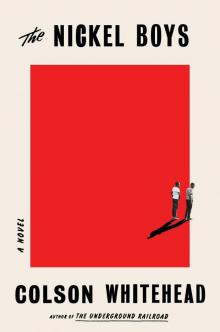 The Nickel Boys
The Nickel Boys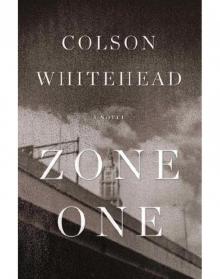 Zone One
Zone One The Underground Railroad
The Underground Railroad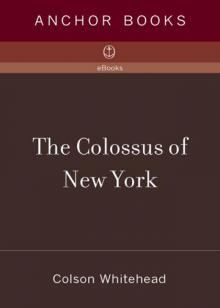 The Colossus of New York
The Colossus of New York The Intuitionist
The Intuitionist Apex Hides the Hurt
Apex Hides the Hurt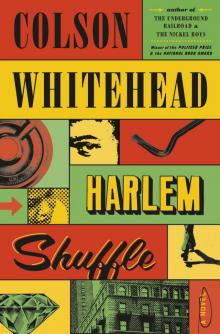 Harlem Shuffle
Harlem Shuffle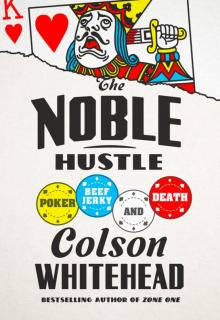 The Noble Hustle
The Noble Hustle